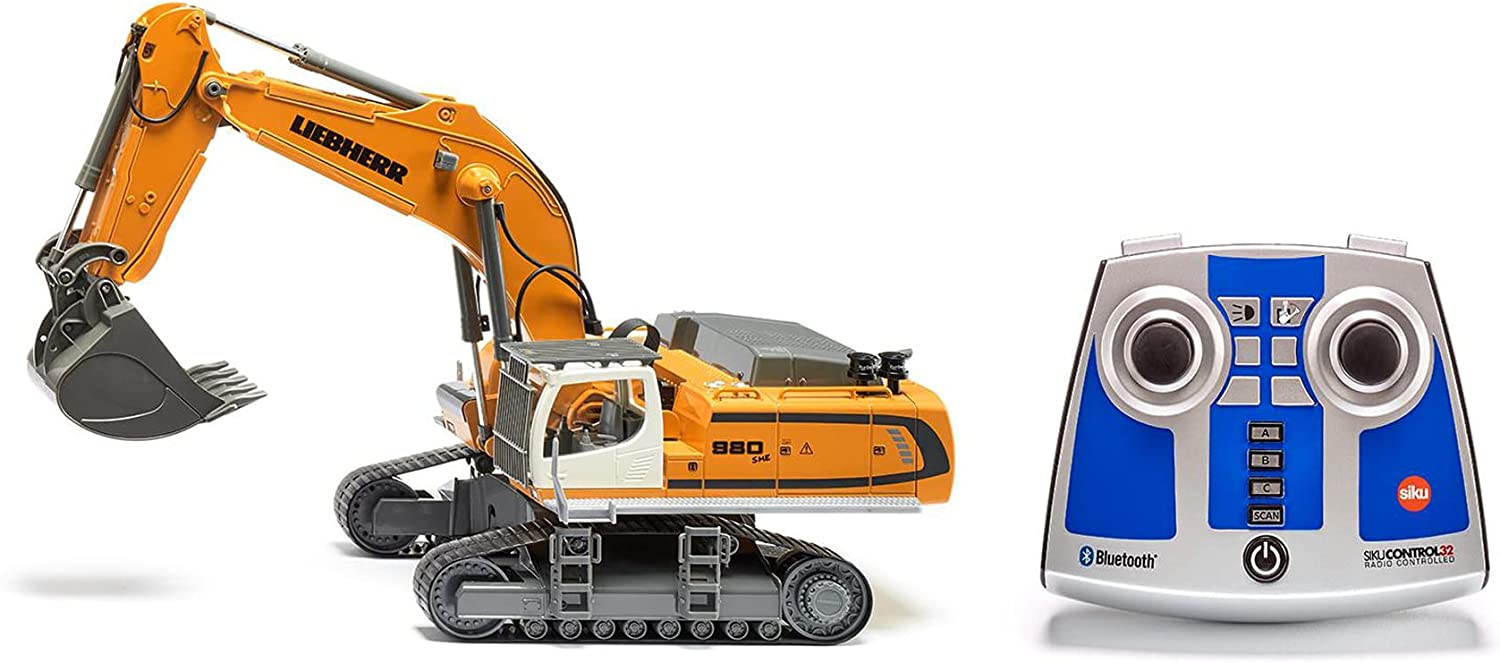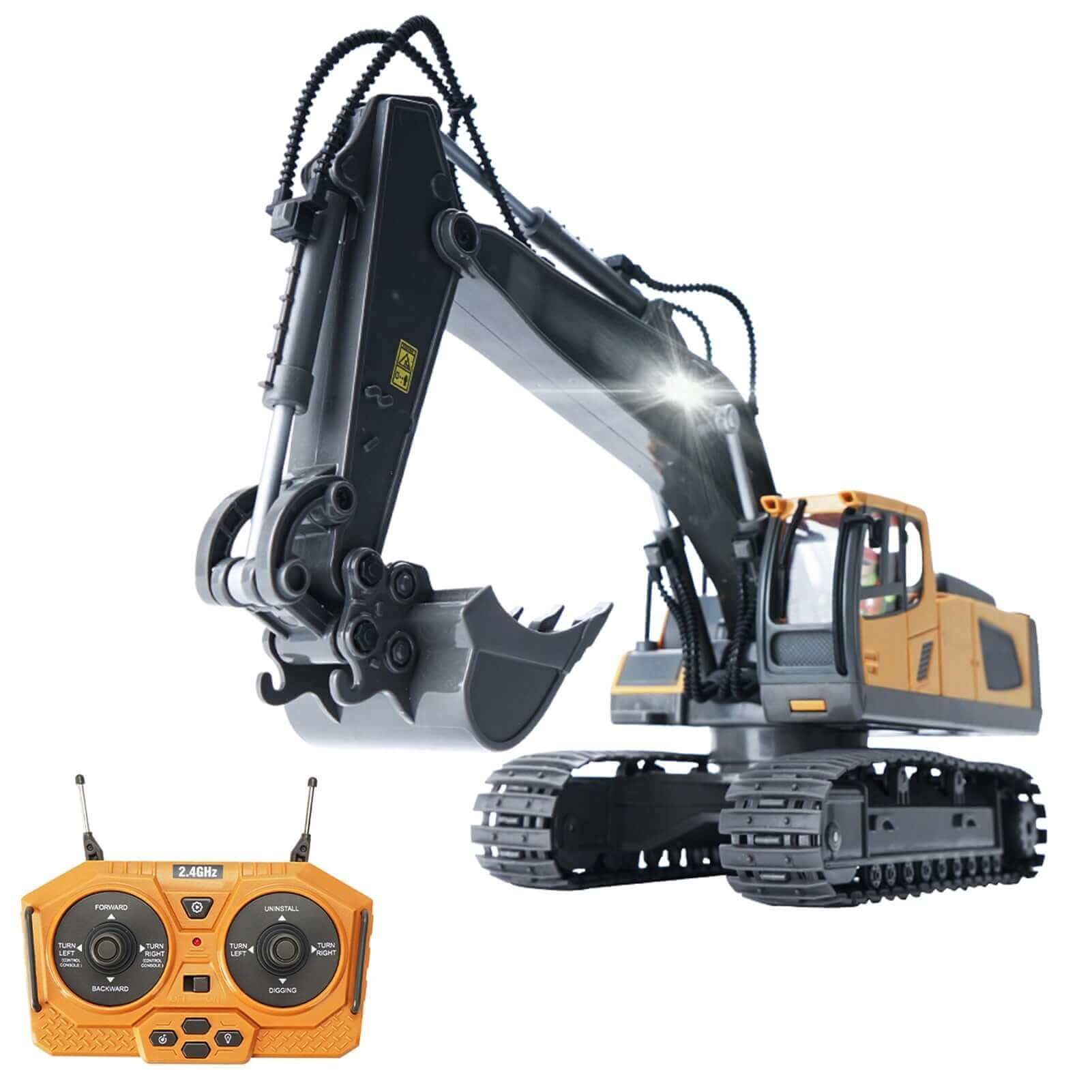Understanding the Role of a rc excavator in Large-Scale Construction Projects
Understanding How Excavator Works and Its Effect on Effectiveness
Excavators play an essential function in building and mining operations, relying upon a complicated interplay of hydraulic and mechanical systems. Their capability to do a selection of tasks rests on both their design and the innovation incorporated within. Understanding these elements can significantly influence functional effectiveness and efficiency. As developments remain to improve the market, one should take into consideration just how these adjustments will affect future techniques and efficiency.
The Fundamentals of Excavator Mechanics

The Function of Hydraulic Solutions in Excavators
At the heart of excavator operation lies the hydraulic system, which plays a crucial function in powering the machine's functions and activities. This system utilizes pressurized hydraulic liquid to move power, enabling numerous actions such as swinging, excavating, and lifting. By taking advantage of the principles of hydraulics, excavators can do tasks with exceptional precision and pressure, boosting general functional efficiency.The hydraulic system contains essential elements, including pumps, shutoffs, and cylinders, which function together to control the circulation and instructions of the fluid. When the driver involves the controls, the hydraulic fluid is directed to certain cyndrical tubes, converting the operator's commands right into physical activity. This mechanism enables smooth and receptive activities, which are necessary in building and construction and excavation settings. double e volvo rc excavator. The performance of the hydraulic system directly affects the efficiency and convenience of the excavator, making it an essential element in modern-day excavation processes
Secret Elements of an Excavator
Recognizing the essential elements of an excavator is essential for realizing how this powerful machine operates. An excavator includes several significant components, including the undercarriage, home, arm, boom, and bucket. The undercarriage supplies security and mobility, usually featuring wheels or tracks to navigate different terrains. The home has the engine and hydraulic systems, enabling the driver to control motion and power the device. The boom expands from the residence, allowing vertical reach, while the arm connects to the container, facilitating excavating and lifting operations.Additionally, the taxi houses the operator, outfitted with controls for specific maneuvering. Each of these components plays a vital duty in the excavator's overall capability, adding to its effectiveness and efficiency on construction websites. Recognizing these parts helps in keeping and maximizing excavator efficiency, ensuring jobs are completed safely and properly.
Attachment Convenience and Its Benefits
Accessory versatility is a vital element of excavators, allowing drivers to switch between numerous tools tailored for particular tasks. This flexibility not just enhances task effectiveness however likewise adds to cost-effectiveness by minimizing the demand for several devices. Recognizing the various kinds of add-ons available can considerably affect the general efficiency and functionality of an excavator on job sites.
Kinds of Add-ons
While excavators are largely recognized for their excavating capabilities, their real flexibility lies in the large range of accessories offered. These attachments improve the excavator's functionality, permitting it to execute numerous jobs past excavation. Usual add-ons include buckets (for digging and scooping), hydraulic thumbs (for realizing materials), and augers (for drilling holes) Grapples are utilized for dealing with and relocating particles, while rippers can damage up tough surface areas. Other specialized attachments, such as trenchers and plows, make it possible for excavators to adapt to specific job needs. This diversity not just enhances the equipment's utility across different sectors, consisting of demolition, landscape design, and construction, yet likewise enables drivers to tailor their equipment to satisfy certain task needs successfully.
Increased Task Performance
Taking full advantage of task performance is a primary advantage of making use of various excavator attachments. Different attachments allow an excavator to do several tasks without needing to change equipment, conserving important time and labor. Making use of a hydraulic hammer can break concrete while a container add-on can excavate dirt, allowing a seamless workflow. This adaptability decreases downtime linked with devices adjustments and boosts performance on-site. Additionally, specialized accessories enhance precision in jobs such as grading or landscape design, causing higher quality outcomes. The capacity to adapt to different job needs not just streamlines procedures however link additionally minimizes the requirement for extra machinery, making certain that tasks are finished swiftly and efficiently. Overall, add-on flexibility considerably adds to enhanced task effectiveness in excavation job.
Cost-Effectiveness and Flexibility
Cost-effectiveness is a significant advantage of making use of versatile excavator add-ons. These add-ons permit a single excavator to execute multiple tasks, decreasing the requirement for extra machinery and labor - double e volvo rc excavator. By switching over in between pails, hammers, and grapples, drivers can take on numerous jobs, from digging to demolition, therefore maximizing tools utilization. This flexibility not only lowers functional expenses however additionally decreases downtime related to changing equipment. Additionally, the capability to tailor excavators with specialized accessories enhances productivity, as they can effectively manage varied tasks according to job needs. In conclusion, the mix of cost-effectiveness and versatility in excavator add-ons adds to improved functional performance and resource appropriation in construction and excavation jobs

Advanced Innovation in Modern Excavators
Modern excavators are significantly geared up with sophisticated technology that changes excavation processes. Automation streamlines procedures, while improved fuel effectiveness lowers operational prices. Furthermore, clever control systems improve precision and safety and security, noting a significant development in excavation tools.
Automation in Excavation Processes
As excavation technology advances, automation has become an important part in enhancing effectiveness and precision on work sites. Modern excavators are equipped with advanced automated systems that help with jobs such as grading, digging, and trenching with minimal operator intervention. These systems use sensors, GPS, and machine knowing algorithms to assure accurate positioning and deepness control, significantly reducing the margin for mistake. Furthermore, automation enables drivers to focus on critical decision-making as opposed to manual controls, leading to boosted performance on the whole. Such innovations not only improve operations yet additionally boost safety by reducing human error in complex operations. The integration of automation in excavation procedures represents a considerable innovation in construction technology, driving the market in the direction of greater efficiency and performance.
Improved Gas Performance
Improvements in technology have likewise caused significant improvements in gas effectiveness for contemporary excavators. Modern machines are furnished with innovative engines that enhance power output while decreasing fuel consumption. These engines make use of cutting-edge burning innovations, such as turbocharging and straight gas shot, to boost efficiency and efficiency. Additionally, lightweight products in building lower overall weight, permitting less power expense during operation. The introduction of variable speed controls enables operators to readjust engine performance according to particular tasks, additionally minimizing gas usage. Consequently, these improvements not only lower functional costs but likewise add to ecological sustainability by lowering exhausts. In general, improved gas performance in excavators is a necessary development that bolsters performance and financial viability in the building market.
Smart Control Systems
While drivers navigate progressively complex work websites, smart control systems in excavators have arised as crucial tools for enhancing performance and accuracy. These advanced technologies use formulas and sensing units to keep track of numerous criteria such as tons weight, surface conditions, and functional performance. By instantly readjusting hydraulic features, smart systems optimize device efficiency, causing boosted performance and decreased wear on components. Additionally, operators take advantage of intuitive interfaces that offer real-time comments and diagnostics, enabling for informed decision-making. This integration of innovation not only simplifies procedures however also lessens human mistake, adding to more secure workplace. As the building and construction industry proceeds to progress, clever control systems will certainly play an essential duty in forming the future of excavator effectiveness and efficiency.
Enhancing Operational Performance With Excavators
Excavators play a necessary duty in boosting operational effectiveness throughout different building and excavation jobs. Their flexibility permits several tasks, consisting of lifting, product, and excavating handling, which improves operations and lowers the requirement for additional devices. With powerful hydraulic systems, excavators can do heavy-duty tasks with accuracy, substantially reducing the moment called for to total tasks. The combination of innovative modern technology, such as general practitioner and automated controls, further optimizes their procedure, making it possible for operators to accomplish higher precision and lower product waste. In addition, modern-day excavators are developed to consume much click reference less fuel and decrease emissions, contributing to both cost financial savings and environmental sustainability. By making use of excavators efficiently, building and construction teams can improve productivity, fulfill job deadlines, and improve overall site administration. This multifunctionality and performance make excavators important tools in the modern-day building and construction landscape.
The Future of Excavators in Construction and Mining Industries
As the building and construction and mining markets evolve, the future of excavators is poised for considerable transformation driven by technical innovation and transforming functional needs. Developments in automation and expert system are improving excavator capacities, permitting for improved accuracy and effectiveness in procedures. Autonomous excavators are emerging, lowering the demand for human intervention and minimizing the risk of accidents.Moreover, the combination of telematics and IoT technology allows real-time tracking of device efficiency and anticipating upkeep, optimizing uptime. Green designs, including hybrid and electric designs, are obtaining traction, lining click resources up with sustainability goals within the industry.Additionally, the usage of sophisticated materials and lighter designs improves gas efficiency while preserving efficiency requirements. As these patterns progress, excavators will play an essential role in meeting the enhancing demands for performance and safety in building and construction and mining, ultimately transforming operational landscapes.
Often Asked Concerns
How Do Weather Condition Conditions Affect Excavator Performance?

Weather significantly affect excavator efficiency, as rainfall and mud can hinder grip and stability, while extreme temperature levels may affect hydraulic systems. Operators must adjust to these variables to ensure suitable performance and safety and security during procedures.
What Precaution Should Operators Comply With While Utilizing Excavators?
Security steps for excavator drivers include wearing proper individual protective tools, performing pre-operation inspections, ensuring proper interaction with ground workers, maintaining a secure distance from above threats, and sticking to well established operational methods to stop mishaps.
Exactly How Often Should Excavators Be Maintained for Optimal Performance?
Excavators ought to be kept regularly to ensure peak efficiency, typically every 250 operating hours or as defined by the maker. Routine checks boost dependability, protect against unexpected malfunctions, and extend the lifespan of the equipment.
What Is the Ordinary Lifespan of an Excavator?
The average life expectancy of an excavator typically varies from 10,000 to 15,000 hours of operation. Factors affecting long life include maintenance techniques, operating conditions, and the top quality of the device itself, affecting total productivity and performance.

Can Excavators Operate on Unequal Terrain Successfully?
Excavators can operate successfully on uneven terrain as a result of their verbalized designs and flexible tracks. These features allow them to maintain stability and traction, enabling effective operation in tough environments generally encountered in construction and landscape design tasks. Each of these parts plays an important role in the excavator's overall functionality, adding to its effectiveness and effectiveness on building sites. Taking full advantage of work performance is a main advantage of using various excavator add-ons. While operators browse increasingly intricate task websites, clever control systems in excavators have actually arised as necessary tools for boosting efficiency and precision. Excavators play an essential role in enhancing functional efficiency throughout various building and construction and excavation projects. Advances in automation and synthetic intelligence are improving excavator abilities, permitting for enhanced accuracy and efficiency in procedures.